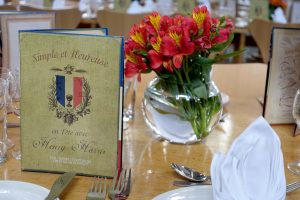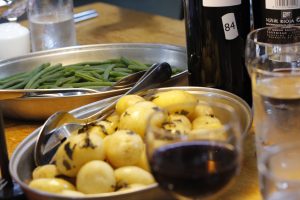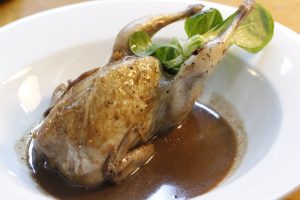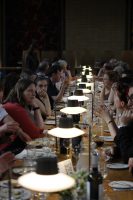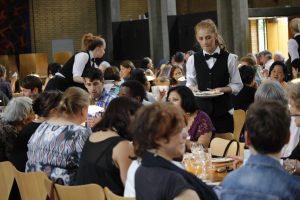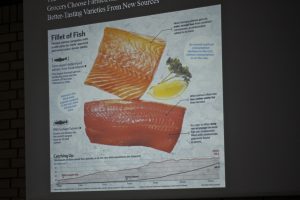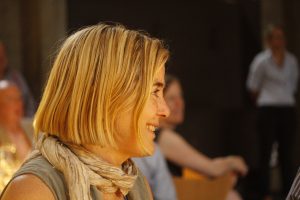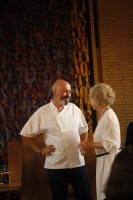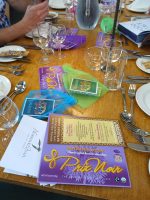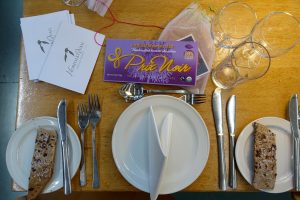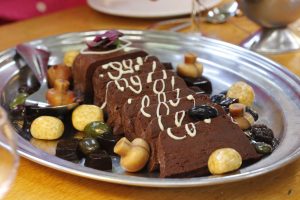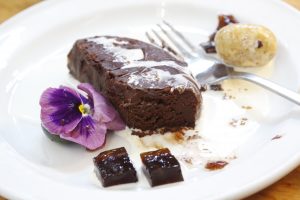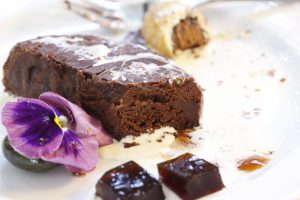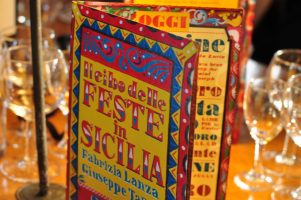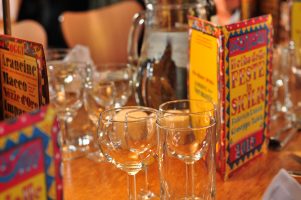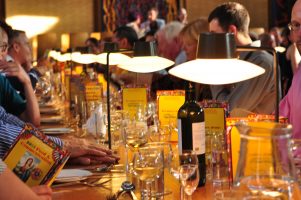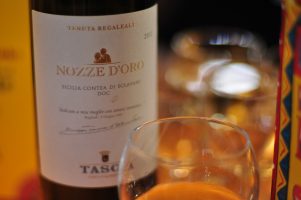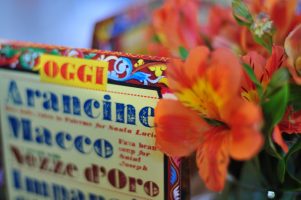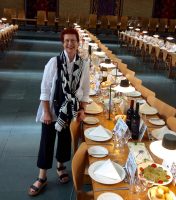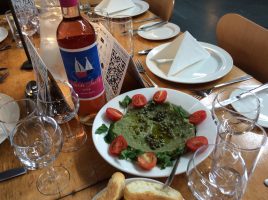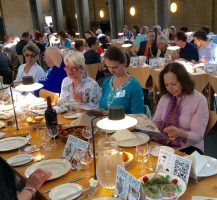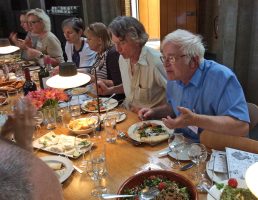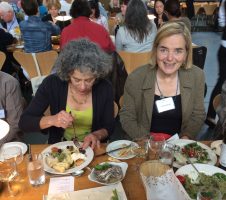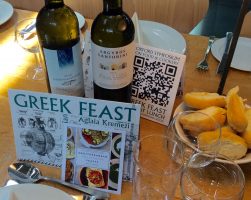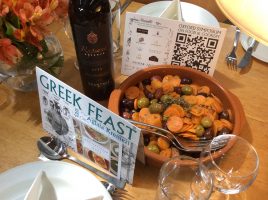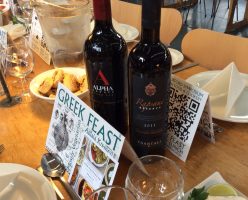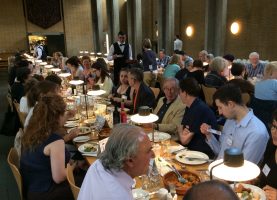
Report by Naomi Duguid
I love the sense of anticipation in the room at the opening of the Oxford Symposium on Food and Cookery. Generous welcoming words from several of the Trustees set the tone. This year Claudia Roden reminded us that we symposiasts are a mixed lot of people – academics, food enthusiasts, food writers – who have a lot to offer each other, and that the Symposium is a chance for us to connect, and to enjoy ourselves. Yes!
Then we launched straight into this year’s theme – Food and Communication. Ray Sokolov kicked off by talking about unreliable communication by chefs. He started with Carême, whose books are rather poignant he told us, as well as misleading, for they portray a style of cuisine that was in fact already old-fashioned at the time he wrote them. He went on to discuss Escoffier and then the work of more recent chefs and to point out that food is always changing, and should not be looked at as an “ancestral relic”.

Anne Willan’s Jane Grigson Memorial Lecture was a clear and elegant presentation of early cookbooks “from Platine to Brillat-Savarin” and of her system for classifying them in the form of a “Tree of Cookbooks.” She showed images of the collection of historic cookbooks she and her husband have created. We looked in detail at wonderful woodcuts that showed the equipment and activities of early kitchens. I found it all fascinating. One of her final images was a lovely line drawing showing an old chef and a young one, a drawing by Carême.
The opening reception and meal is the first time many of us have a chance to meet new people, discover familiar faces, and get started on the serious business of tasting the food of the kitchens at St Catherine’s, which are under the direction of chef Tim Kelsey. They always do a wonderful job, not just of cooking, but of serving too. The first night’s supper was inspired by the presence of Anne Willan, and so it was anchored in French tradition. Chef Henry Harris developed the menu, titled “Fête Simple et Heureuse” with the St Catz kitchen. The hearty burgundian salad and rich cassoulet were delicious and very welcome, even on a warm night. And how did they manage to make such perfect apple tart? Domaine La Louvière’s wines, presented by winemaker Jem Harris, paired beautifully with it all.

The mild weather enticed many of us to hang around outside after supper talking, while sipping our potion of choice… I think I look forward to the long easy evenings almost more than anything else. But this year there was competition for our attention. On Friday and Saturday night there were very special documentary films showing: one, called “Amuri,” about the festive foods of Sicily, presented by Fabrizia Lanza, and the other “Festins Imaginaires,” about the recipes compiled by prisoners in gulags, concentration camps and POW camps, by Anne Georget.
On Saturday morning came the awarding of the Sophie Coe prize for food history writing. This year’s winner was Anya Zilberstein, for her essay ‘Inured to Empire: Wild Rice and Climate Change’. The prize was presented by Michael Coe, who spoke beautifully about his wife Sophie Coe.
Saturday and Sunday are the heart of the Symposium, with both plenary talks and breakout sessions. Choice is painful sometimes! The great thing is that it’s possible, if you move quietly, to slip in and out of rooms and sample, rather than being locked into one choice. And because the papers are posted online, if you miss sessions and feel regretful, you can at least get the substance of the presentations.

It seems to happen every year that the theme, whatever it is, becomes an elastic inclusive concept in the hands of the presenters. This year’s theme, Food and Communication, was no exception. There was an enticing array of papers and talks, on topics that ranged from cookbooks during the Spanish Civil War, to cookbooks in the digital age, from food and recipes in European paintings to Japanese slurping etiquette. Barbara Wheaton’s presentation of her work-in-progress database for the analysis of cookbooks was dazzling. There were talks about notable food figures from the past, including Emily Hahn, Mrs. Marshall, Carême, Escoffier, and de Pomiane, and discussions of allergies, food labels, food and fascism, food images on Italian renaissance maiolica, the language of menus in Edwardian England, menus in New York City, superfoods, and battles over the reputation of fish. And I’ve only mentioned a small sample of all that was on offer.
The other constant is the spectacular food. Each lunch and supper has a theme. And each meal is accompanied by wines – donated by sponsors – that match the geography and culture of the food. The menus are beautiful. They’re designed by Jake Tilson, who also designs the logo and graphics for the Symposium.
Saturday’s lunch was a celebration of the Sophie Coe Prize (this is the twentieth year it has been awarded), and thus was shaped around chocolate. We started with a sampler of preserved fishes from the Fish Society and moved on to quail with chocolate. The dessert, sponsored by the Oxford University Press to celebrate the publication of The Companion to Sugar and Sweets, was over-the-top: platters of sliced chocolate truffle cake on a bed of mocha-flavored jelly cubes, with trompe-l’oeil garnishes of chocolate filled “potatoes”, “mushrooms” and “olives”.

How was it that we all looked forward to supper on Saturday, after that lunchtime extravaganza? But we did. It was another feast, a Sicilian Feast directed by Fabrizia Lanza, with wines presented by her cousin Giuseppe Tasca of Tasca d’Almerita. There were arancine, and a fava bean soup that I loved, followed by a lamb pie (impanata di agnello), salad, and a gelo di melone to send us on our way.
Aglaia Kremezi, who directed the lunch on Sunday gave us a briefing about it that morning. I was happy to hear her say that her Greek Feast would be “light, mostly vegetables”. And it was all those things and delicious: Greek mezze with a variety of breads, Greek cheeses with fruit spoon sweets, and pistachio stuffed cookies. Seven excellent Greek wines accompagnied this simple and yet elegant feast, from Assyrtiko to Xinomavro, Santorini to Macedonia.
Sunday is the day for awarding the Cherwell Prize (a student grant), young chef grants, and student research grants. This year’s Cherwell Prize winner Anny Gaul from the US presented her research into the history of two Egyptian dishes: ful medammes and macaroni béchamel. I was happy to be transported to the streets and kitchens of Cairo. The young chef winners were Elizabeth Yorke from India and Kiige Maagu from Kenya, who had the chance to work in the St Catz kitchen on Friday and to attend the sessions on the weekend
And on Sunday, at the end of the day, comes a fun last bit of business: deciding the theme for the Symposium three years hence. Discussions can get heated, and the voting is always a little intense too. This year we had a clear winner for the theme for 2018: Food and Seeds, announced with pleasure by the new chair of the Symposium, Bee Wilson. And then we all said our farewells…

Plenary Sessions
Keynotes
Ray Sokolov
Anne Willan
Barbara Wheaton
Anne Georget, Len Fisher, Diana Henry, Bee Wilson
Awardees
OFS Young Chefs
Elizabeth Yorke, Kiige Maagu, Naomi Kelsey
Cherwell Prize
Anny Gaul
Meals
Friday Dinner
Simple et Heurese en Fete avec Henry Harris
Organise by – Caroline Coran Cuisine par Henry Harris, Time Kelsey avec St Catz personnel
Sponsored by – Domaine La Louvière
Saturday Lunch
Sophie Coe Prize 20th anniversary
Organised by – Jane Levi, Darra Goldstein & Alicia Rios
Cooked by – Tim Kelsey & St Catz Staff
Sponsored by –
The Fish Society
Rococo Chocolates
Norfolk Quail
Oxford University Press
Pares Balta
Food & Wines from Spain
Saturday Dinner
Il Cibo Delle Feste in Scicilia
Organised by – Claudia Roden
Cooked by – Fabrizia Lanza, Giuseppe Tasca and Tim Kelsey & St Catz Staff
Sponsored by –
Anna Tasca Lanza Sicilian Cooking Experience
Tasca Conti d’Almerita
Sunday Lunch
Greek Feast, Mostly Vegetarian Aglaia Kremezi
Organised by – Aglaia Kremezi
Cooked by – Tim Kelsey & St Catz Staff
Sponsored by –
Odysea
Sergiou Bakeries
Alpha Estate
Tsantali
Gaia
Kir Yianni
Argyros
Domaine Gerovassiliou
Biblia Chora
New Wines of Greece


